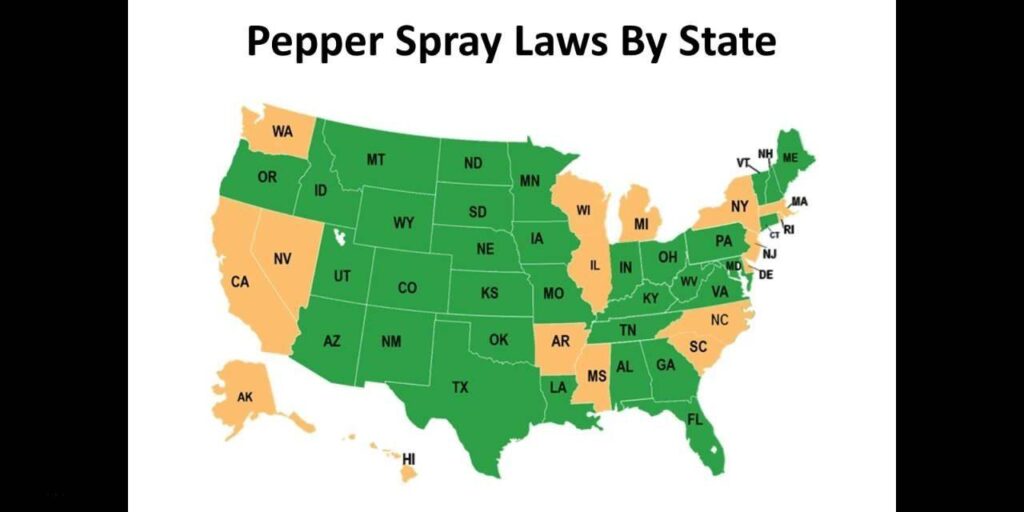Table of Contents
- Legal Regulations Governing Pepper Spray Possession by Minors
- Understanding State and Local Variations in Pepper Spray Laws
- Safety Considerations and Proper Usage Guidelines for Minors
- Recommended Alternatives for Minor Self-Defense and Protection
- In Conclusion
Legal Regulations Governing Pepper Spray Possession by Minors
When it comes to pepper spray possession by minors, legal parameters vary significantly across jurisdictions. In many places, the law explicitly restricts individuals under 18 from carrying pepper spray due to concerns about misuse and safety. These restrictions are often reinforced through a combination of age limits, permit requirements, and strict guidelines on the size and chemical composition of the spray. For instance, some states require minors to obtain parental consent or complete a safety training program before possession is permitted, while others prohibit any form of pepper spray without outright exception.
Understanding these laws is crucial to avoid legal complications. Common regulatory elements include:
- Age Restrictions: Most laws set a minimum age, typically 18, below which carrying pepper spray is illegal.
- Usage Boundaries: Even where possession is allowed, usage is often restricted strictly to self-defense scenarios.
- Product Specifications: Limits on spray strength, size, and formula ensure the device remains non-lethal.
- Permits and Training: Some regions require educational certification or permits before legal possession.
Before acquiring pepper spray, minors and guardians should thoroughly research local laws and ensure compliance to prevent unintended legal consequences and to promote responsible self-defense practices.
Understanding State and Local Variations in Pepper Spray Laws
When it comes to minors carrying pepper spray, the legal landscape in the United States varies significantly from one state to another, often complicated further by local ordinances. Some states permit minors to possess pepper spray under certain conditions, such as parental consent or limits on the size and strength of the spray canister. Others strictly prohibit any form of pepper spray possession by individuals under the age of 18. Moreover, cities and counties within states may impose additional restrictions, reflecting a nuanced approach to balancing self-defense rights and public safety concerns.
To navigate this complex patchwork of regulations, it’s essential to consider key factors that influence legality, including:
- Age requirements: Minimum legal age can range from 16 to 18, with some jurisdictions requiring accompanying adult supervision.
- Permissible formulations and sizes: Limits on the concentration of chemicals and maximum spray volume are common parameters.
- Usage restrictions: Rules often specify where pepper spray can be carried or used, such as prohibitions in schools, government buildings, or public transport.
- Mandatory training or certification: A few locations require minors to complete safety training before lawful possession.
Safety Considerations and Proper Usage Guidelines for Minors
When it comes to equipping minors with pepper spray, understanding the safety protocols is crucial to ensure responsible use. It is essential that young users avoid spraying in enclosed spaces to prevent accidental inhalation by themselves or others. Additionally, instructional training should emphasize the importance of aiming away from the face and towards an attacker’s torso or legs to minimize permanent injury. Storage is equally important – pepper spray should always be kept out of reach of children when not in use, helping prevent misuse or accidental discharge.
Proper usage also involves awareness of the legal and ethical boundaries surrounding self-defense tools for minors. Before carrying pepper spray, they should be well-informed of the laws that may require parental consent or limit possession based on age. Parents and guardians play a vital role in guiding minors through these considerations by discussing scenarios where its use is justified. A recommended checklist includes:
- Confirming local legal age restrictions and possession permissions
- Conducting supervised demonstrations on how to safely deploy the spray
- Regularly reviewing safe storage and handling practices
- Emphasizing that pepper spray is strictly for emergency self-defense, not for pranks or threats
Recommended Alternatives for Minor Self-Defense and Protection
When pepper spray is off-limits for minors due to legal restrictions, exploring other options can be crucial for personal safety. Many alternatives offer non-lethal protection without the complications involved in carrying chemical deterrents. Personal alarms are excellent for drawing immediate attention in an emergency, emitting loud sounds that can deter potential attackers and alert passersby. Compact and easy to carry, these devices often fit unobtrusively on keychains or backpacks, providing peace of mind without legal concerns.
Other practical solutions include self-defense keychains, which are designed to be discreet yet effective at warding off threats. Items such as tactical pens or small flashlights can double as defense tools while serving everyday purposes, making them convenient and less likely to be perceived as weapons. Additionally, teaching minors basic self-defense techniques and situational awareness can empower them far beyond any physical tool. Combining these strategies not only respects legal boundaries but significantly enhances personal safety through preparedness and confidence.
In Conclusion
In conclusion, while the desire for personal safety is universal, the legal landscape surrounding minors carrying pepper spray for self-defense is complex and varies significantly by jurisdiction. It’s crucial for young individuals and their guardians to thoroughly research local laws and regulations to ensure compliance and safety. When used responsibly and legally, pepper spray can be an effective tool for self-protection, but education and awareness remain the best defense. Stay informed, stay safe, and always prioritize lawful and responsible self-defense measures.Check Our Other Blogs
- StunGun – Your Trusted Source for Stun Guns, Laws, and Self-Defense Tips
- PepperSprayLaws – Your Trusted Resource for Pepper Spray Information
- StunGunLaws – Your Trusted Guide to Stun Gun Legality and Safety




